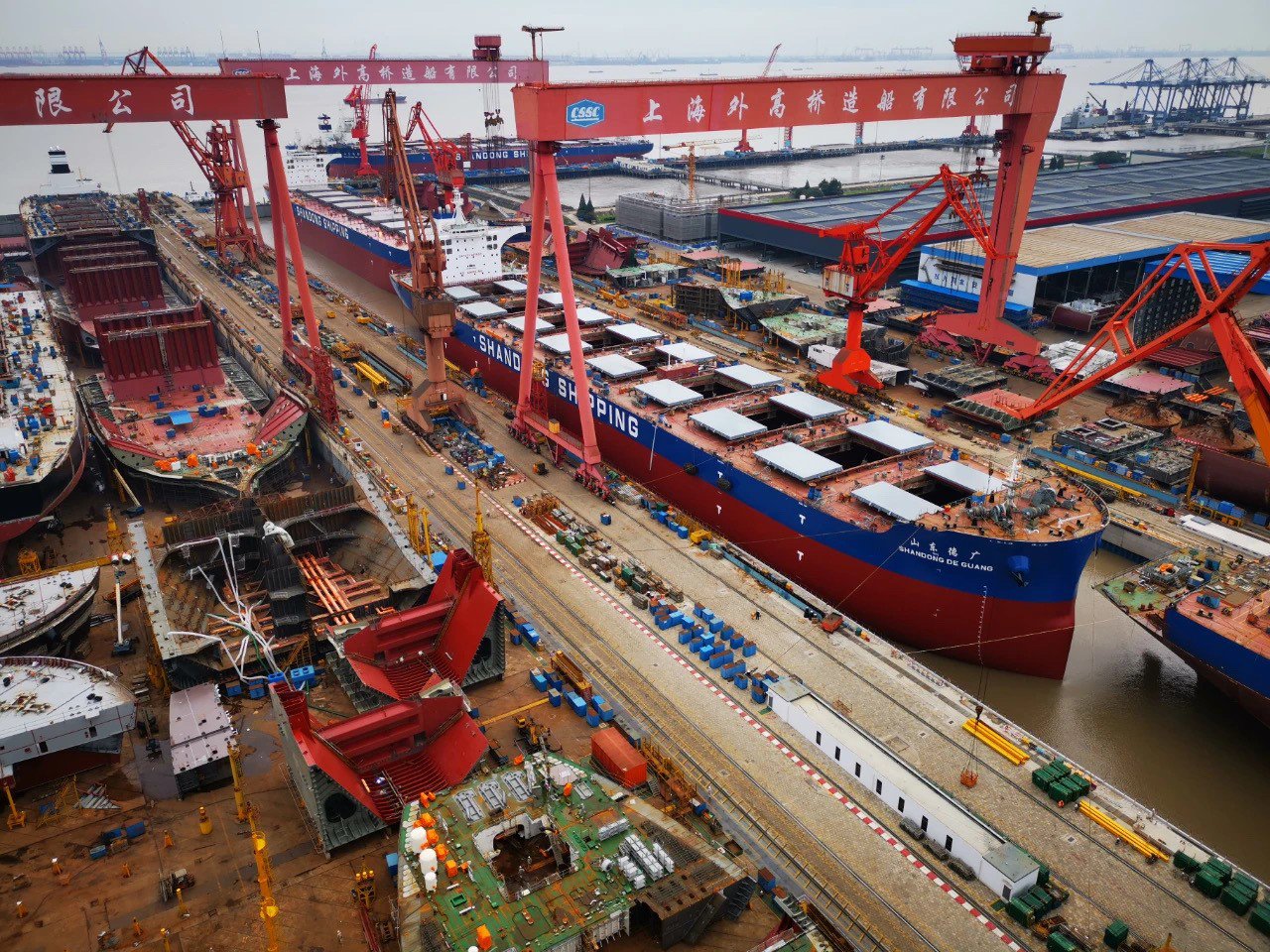
August 2023
Sinofar Supply Chain Partners with Xiamen Xiangyu for Win-Win Cooperation, Empowering Industry Innovation
Learn More >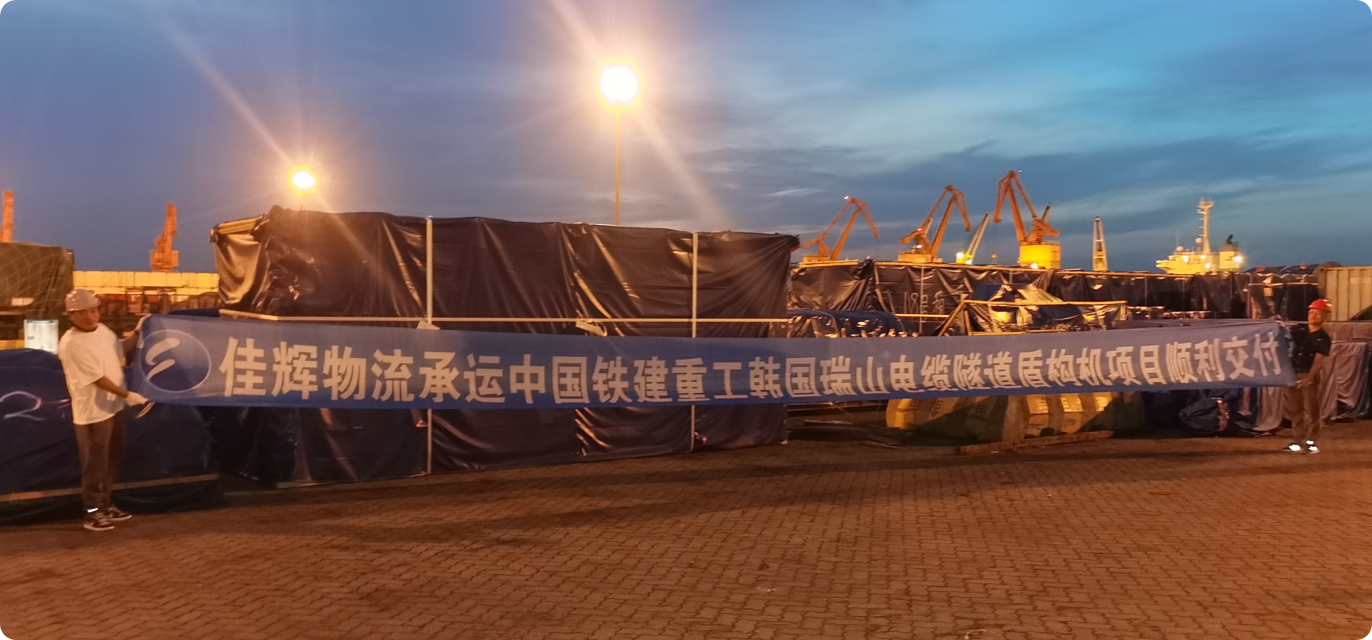
July 2023
Dalian Jenshine Opens New Country Business - Successfully Completes South Korea Small Shield Tunnel Export Transport
Learn More >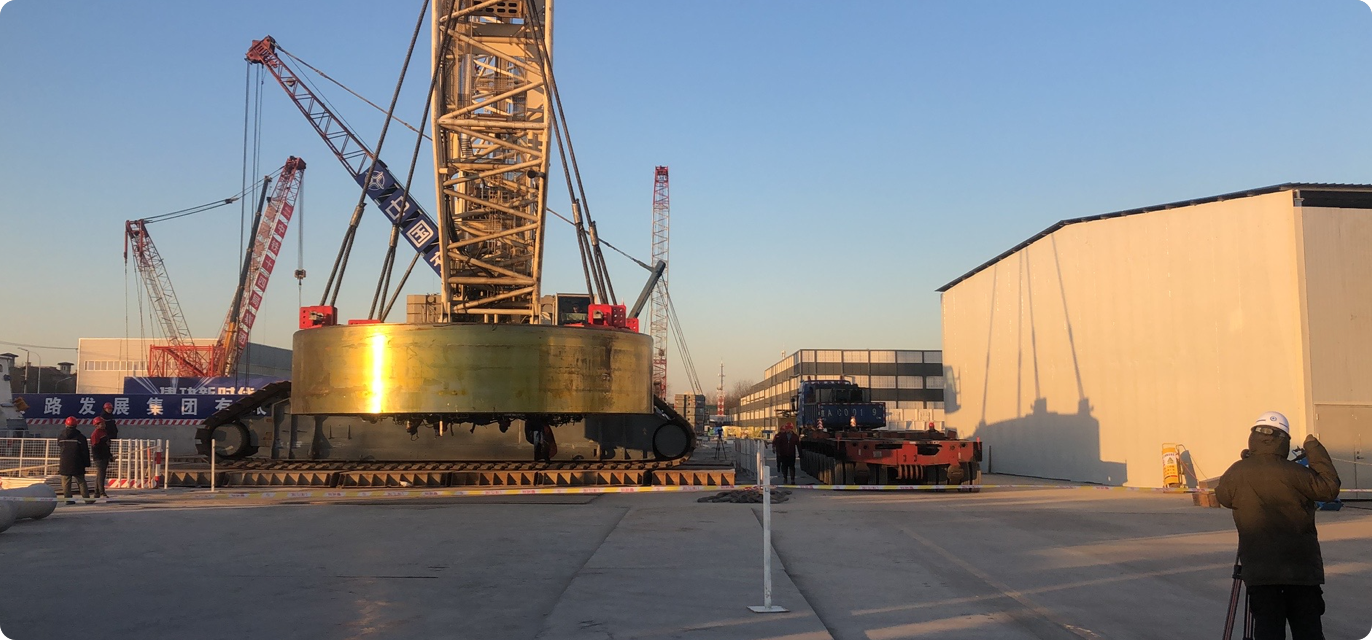
July 2023
Dalian Jenshine Successfully Initiates Beijing East Sixth Ring φ16.03-meter Large Shield Tunnel Return
Learn More >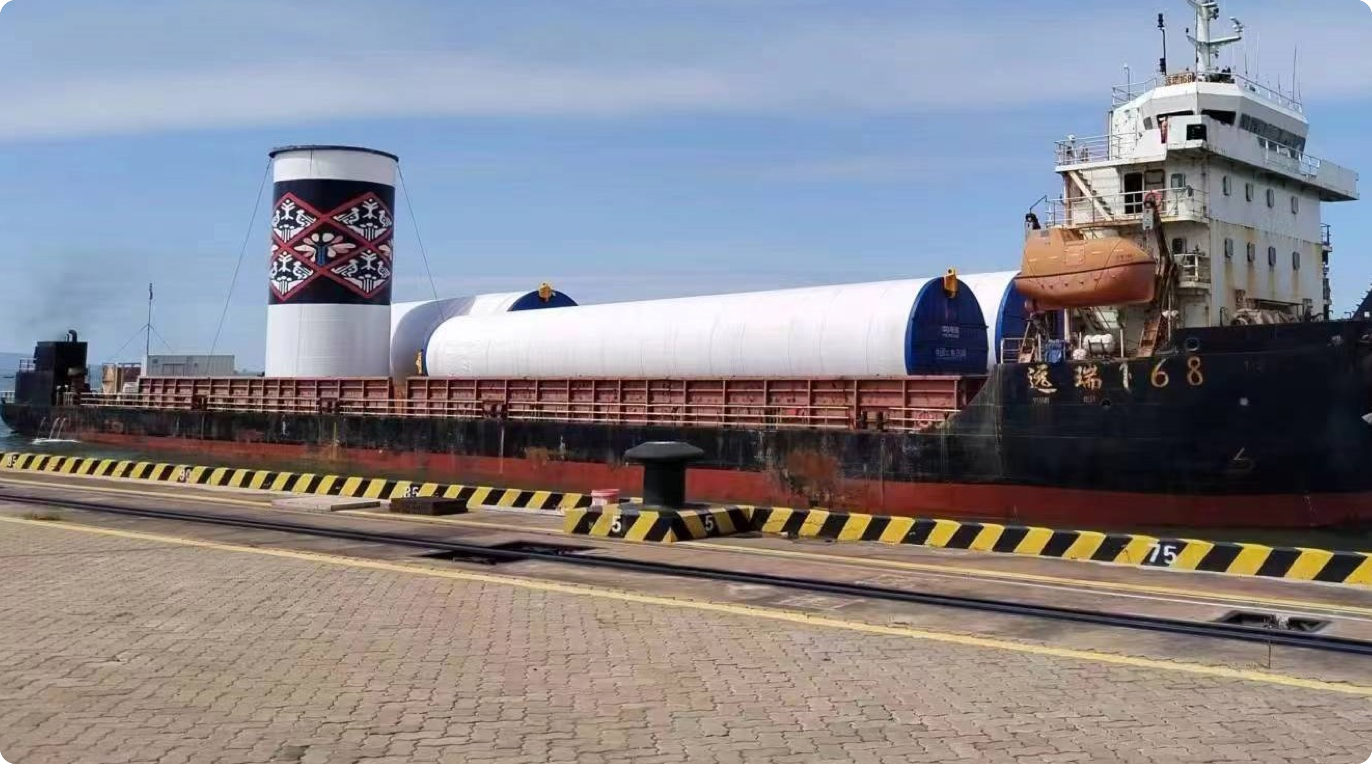


September 2023
Forum of Digitalization in Shipping Services, Logistics, Terminal Operations
Learn More >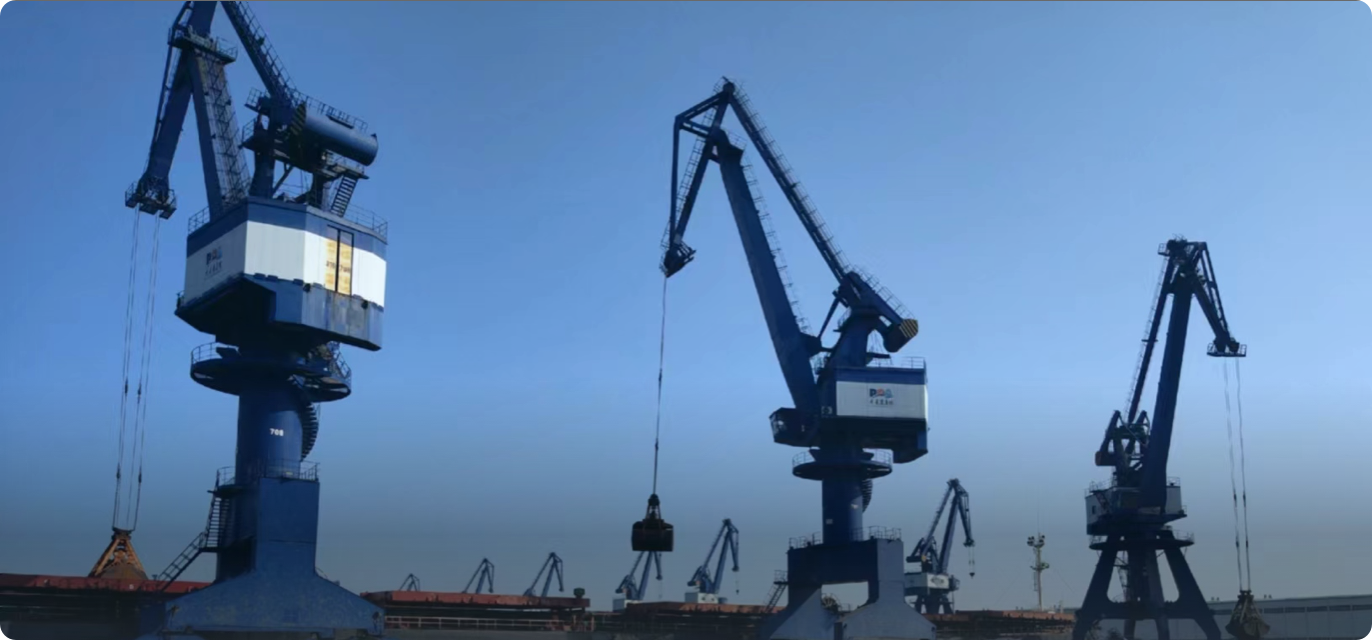
August 2023
Sinofar Supply Chain Partners with Xiamen Xiangyu for Win-Win Cooperation, Empowering Industry Innovation
Learn More >
July 2023
Dalian Jenshine Opens New Country Business - Successfully Completes South Korea Small Shield Tunnel Export Transport
Learn More >
July 2023
Dalian Jenshine Successfully Initiates Beijing East Sixth Ring φ16.03-meter Large Shield Tunnel Return
Learn More >
November 2023
Customs scraps requirement for health status declarations
China's General Administration of Customs announced on Tuesday the ending of mandatory health declarations for individuals entering or exiting the Chinese mainland, starting Nov 1.
Both inbound and outbound passengers will no longer need to fill in the entry or exit health declaration form, according to the Frontier Health and Quarantine Law and the rules for its implementation.
However, individuals showing symptoms of infectious diseases such as fever, cough, difficulty breathing, vomiting, diarrhea, skin rash, unexplained subcutaneous bleeding, or those already diagnosed with infectious diseases must voluntarily report their health status to customs officers.
People with infectious disease symptoms must cooperate with customs in carrying out health quarantine procedures, including temperature checks, epidemiological investigations, medical examinations and sample testing, it said.
China adopted the quarantine declaration system in January 2020 as a measure to combat COVID-19, requiring travelers to fill in exit/entry health declaration forms and declare their health to customs.
China MSA: Provisions on Control of Targeting Ships
The Provisions apply to ships flying Chinese flags, and foreign ships that sail, berth, or operate at ports (including mooring points at sea), inland waters and territorial seas of China.
Target ships include:
- Ships flying Chinese flags who have been detained twice within 12 months for failing safety inspections (including Port State Control) and foreign ships detained twice within 12 months in Port State Control by China MSA;;
- Ships refusing to cooperate after violating laws and regulations;
- Ships with certificates that are forged, altered, transferred, bought, or leased, or ships of which the structure and arrangement have been altered without approval by the relevant authorities;
- All ships of a shipping company involved in a marine casualty with 5 or more persons lost or missing, and found to have major problems in safety management after investigation;
- All ships of a shipping company of which one third of ships flying Chinese flags are listed as target ships.
Control measures of Foreign Target Ships:
Port State Control (PSC) of foreign target ships should not be influenced by factors such as sailing schedules, loading/unloading, etc, and should be conducted in each calling port if conditions permit. The reason should be reported to regional MSA when the inspection is not conducted.
MSAs at all levels should enhance the control and conduct more-detailed inspections of target ships in the latest list.
As the biggest non-governmental shipping agency in China, Oceanfavor is capable and most willing to assist and coordinate in PSC inspections.
China's import and export volume grows by 0.03% year-on-year in first 10 months
China's total import and export volume grew by 0.03 percent year-on-year, reaching 34.32 trillion yuan ($4.72 trillion) between January and October, as the country's foreign trade posts a stable recovery despite mounting external challenges.
Over the period, the country's exports grew by 0.4 percent year-on-year to hit 19.55 trillion yuan, while imports declined by 0.5 percent year-on-year to reach 14.77 trillion yuan, according to data released by the General Administration of Customs (GAC) on Tuesday.
Between January and October, the ASEAN remained China's largest trading partner, followed by the EU and the US.
It's worth noting that China's imports from the US grew by 0.2 percent year-on-year between January and October to reach 948.87 billion yuan, official data showed. Recently, a delegation of Chinese enterprises signed 11 agricultural purchase contracts with US exporters worth billions of dollars, one of the few mass signings since the US initiated a trade war against China in 2018.
Zhoushan ranked 4th biggest refueling port around the world and Oceanfavor remained the top bunkering agent in the port
The 6th International Petroleum and Natural Gas Enterprises Conference 2023 was held on October 25 in Zhoushan.
The China Petroleum Circulation Association (CPCA) announced the "ten biggest ports for ships refueling all around the world" and the "ten biggest enterprises for ships refueling all around the world" in 2022 during the conference. Zhoushan port ranked 4th while Singapore and Rotterdam shared the 1st and 2nd places, Sinopec Fuel Oil Sales Co. and Chimbusco ranked 2nd and 4th biggest refueling enterprises respectively.
According to the data disclosed, total 6.02 million tons of fuel were supplied to ships at Zhoushan in 2022.
Being committed to marine bunkering agency business for decades, Oceanfavor remained the biggest agents for 2 consecutive years in terms of volume of ships and fuels handled in Zhoushan.
Anchorages management mechanism in Yangtze river set up
To optimize the operational procedure and efficiently leverage the anchorage resource in Yangtze river waters, a on-line centralized anchorage management system was launched on October 28, users like ships, shipowners, operators and agents may apply for anchor berths online by logging on the applications newly designed.
Navigation restricted areas of Miaodao Archipelago in Bohai Sea
Recently, many merchant vessels were ordered to stop for investigation when passing through the navigation restricted areas of Miaodao Archipelago for calling at Tianjin, Qinhuangdao, Jingtang, Longkou and other ports around the Bohai Bay.
Miaodao Archipelago in the Bohai sea area is a restricted area where merchant vessels are not allowed to navigate except through the Laotieshan channel and/or the Changshan Channel. The location of the aforementioned restricted area is published on the ECDIS and also in navigation warnings and Notice to Mariners. As some merchant vessels may not be aware of such restrictions, when calling the ports around the Bohai Bay, they sometimes pass through this area unintentionally to save time and distance.
The sketch of Laotieshan Channel and Changshan Channel is enclosed hereunder, where navigation is allowed for merchant vessels.

In such cases, local MSA would usually conduct investigation on the vessel and will not give green light to her departure until the investigation is completed. Meanwhile, owners and the crew members may be subject to penalties in case the violation is confirmed by MSA.
In addition, as there are some fishery farms and fixed fishing nets in this restricted area, civil claims may be lodged by the local fishery farm owners due to damages caused by the vessel.
Foreign vessels are reminded to pay attention to the above navigation restricted areas at Miaodao Archipelago in the Bohai sea and to avoid these areas except passing through the two nominated channels.
China's first domestically made large cruise ship delivered
China's first domestically made large cruise ship Adora Magic City was named and delivered to its operator on November 4, making China the only country in the world to have mastered the technologies of building aircraft carriers, large liquefied natural gas carriers and large cruise ships at the same time.
After eight years of research and development, as well as five years of design and construction, the 135,500-gross-tonnage vessel is going to make its maiden commercial voyage on the first day of 2024, according to official sources.
October 2023
China's shipbuilding sector sees rise in deliveries and newbuildings
China's shipbuilding industry continued to lead globally in the first eight months of this year with double-digit increases in both output and newbuildings, industry data showed.
The country's shipbuilding output reached 27.98 million dwt (deadweight tons) in this period, up 16.9 percent increase year-on-year, according to the China Association of the National Shipbuilding Industry.
Newbuildings in China's shipbuilding sector surged 86.5 percent from last year to total 52.31 million dwt, the association said.
The output accounts for 49 percent of the global total, and newbuildings amount to a 68.8 percentage share, the data revealed.
China's ship exports maintained robust growth momentum in the first eight months of 2023, with the export value surging 20.2 percent year-on-year to $16.18 billion.
International cruises fully resume after hiatus of 3 years
China's Ministry of Transport on Tuesday announced a full resumption of international cruise voyages in the country, after the successful pilot program that reintroduced international cruise operations in Shanghai and Shenzhen, Guangdong province
In a notice issued to various relevant local departments, the ministry outlined various measures and preparations to ensure the safe and efficient operation of international cruise tours.
In addition to regular requirements, such as legal qualifications for the port and the operator, and safety and navigability standards of cruise vessels, the ministry requires newly built vessels or those that did not operate during the COVID-19 pandemic to conduct a sea trial in accordance with regulations to test vessel status.
The operators and ports are ordered to refine COVID-19 control protocols and stock necessary materials, the ministry said.
China's soybean imports up 15% in January-July period
China imported 62.3 million tons of soybeans in the first seven months of this year, up 15 percent from a year earlier, customs data showed.
In July alone, the country's soybean imports reached 9.73 million tons, down from 10.27 million tons in June but more than the 7.88 million tons imported in the same month last year, according to data from the General Administration of Customs.
The per-tonne value of the soybean imports increased 1.3 percent year-on-year in the first seven months to 4,334.6 yuan ($605.39).
The country, as the world's largest soybean importer, imported a total of 91.08 million tons of soybeans last year. Imported soybeans are usually crushed into meal for animal feed in China.
First dual-fuel car truck carrier ship built in Guangzhou
The first dual-fuel pure car truck carrier (PCTC) built in the southern Chinese region was delivered for use after a delivery and acceptance ceremony was organized in Guangzhou's Nansha district on Tuesday.
The 7,000-vehicle dual-fuel PCTC, named Emden, was jointly constructed by Guangzhou Shipyard International Co. Ltd (GSI) and China Shipbuilding Trading Co. Ltd (CSTC) for Norway's SFL company.
The vessel has a total of 13 decks that can accommodate approximately 7,000 vehicles, including two decks capable of carrying hydrogen fuel vehicles.
Emden is designed with a natural gas (LNG)/fuel dual fuel propulsion system, with a maximum range of 15,000 nautical miles.
With contracts to build 25 PCTCs in hand, GSI has now become the shipbuilder with the second largest construction orders for PCTCs in the world.
New Guidelines for 38 High Risk Collision Precaution Zones
China MSA recently issued a new Guidelines for the Prevention of Collisions between Merchant Vessels and Fishing Vessels.
The Guidelines identify 38 sea areas designated as high-risk precaution zones for collisions involving merchant and fishing vessels, where shipping routes and fishing grounds overlap. The Guidelines contain detailed safety navigation advice, with emphasis being made on high levels of vigilance with enhanced bridge watchkeeping and lookout duties. The Guidelines are for vessels to conduct a collision risk assessment and make voyage plans that take particular features of fishing vessels in those areas into account, including keeping a minimum of two watch standers consistently on the bridge, amongst other measures. The Guidelines also set out the action to take to avoid a collision in these areas, including communications and lights to be used, and emergency rescue in case of a collision.
For full details please refer to the Guidelines, which includes an English translation,here. The table of high-risk precaution zones can be accessed here.
First Capesize bulker lightened at Jingzhou
Jingzhou recently became a new option for large bulk carriers to lighten cargo in China. On 27th September 2023, MV Spring Bright carrying iron ore successfully lightened part cargo at Jingzhou before she proceeds to her final destination port. The breakthrough will significantly increase the annual throughput of the port and facilitate bulk ore trading in NE China region.
Biodiesel fuel delivered to ship at Zhoushan
The first order of biodiesel fuel was delivered to a container ship MV Xin Ming Zhou by bunker barge MT Si Jie 21 at Zhoushan Mazhi inner anchorage by means of ship-to-ship transfer operation on October 9, 2023, marking the new start of multiple marine fuels supply at Zhoushan.
The fuel, called B24 biodiesel fuel, consists of 24% biodiesel fuel and 76% conventional low sulphur fuel oil, in conformity to ISO8217/2010 standard for marine fuel oil which was required by IMO, could reduce carbon emissions by up to 21%.
By the end of the day, Zhoushan became the first tax-free bunkering port in China, being able to supply clean energy including LNG and biodiesel fuels among traditional fossil fuels.
Traffic capacity to Changshu port goes up
Thanks to the concerted efforts made by pilots and the port authorities, maximum permissible drafts to Changshu port were lifted to 11.80 meters, with the new draft restriction, vessels are able to ship about 5000 metric tons more cargo per shipment and add one million metric tons throughput to the port annually.
Ballast water from Japanese ships tested for radioactivity
Chinese ports have apparently begun testing the ballast water of Japanese ships for radioactive material, after the Japanese government began releasing radioactive water from the quake-damaged Fukushima No. 1 Nuclear Power Plant in late August.
Ships have been informed that if too much radioactive material is found in their ballast water, they will be denied entry into China. However, no vessels have been turned away yet.
Maritime safety administration officials in the ports of Tianjin and Shandong province, home to Qingdao, Weihai, and Rizhao ports, have been collecting and testing ballast water samples from Japanese cargo ships.
There have apparently been no official announcements by the Chinese authorities regarding ballast water from Japanese ships.
China imported record volumes of crude oil in the first half of 2023
Record volumes of crude oil were imported into China during the first half of 2023 because of refinery expansions in the country and initiatives to reopen the economy after the government eased COVID-19 mobility restrictions. China imported an average of 11.4 million barrels of crude oil per day (b/d) in the first half of 2023, a 12% increase from 2022’s annual average of 10.2 million b/d.
In the first half of 2023, China's crude oil imports increased from 8 of the 10 top countries it imported crude oil from in 2022, according to China’s General Administration of Customs data.
China sourced much of the additional crude oil it imported in the first half of 2023 from Russia, Iran, Brazil, and the United States. Compared with 2022 averages, China’s imports from Russia increased by 23% (400,000 b/d), from Saudi Arabia by 7% (130,000 b/d), and from Brazil by 49% (250,000 b/d). The 2.6 million b/d of crude oil that China imported from Russia in June is the largest volume China has ever imported from any country in any month. China’s imports from the United States in the first half of 2023 more than doubled from 2022.
September 2023
COVID-19 tests no longer required for travelers to China
In consideration of both the domestic and overseas situations on the Pandemic, and to facilitate people-to-people exchange, the Foreign Ministry has announced that beginning on August 30, it would no longer require travelers entering China to take a PCR test or an antigen test for COVID-19, this will also apply to the seafarers arriving in China ports with their vessels from foreign ports.
China overtakes Greece as largest shipowner
China has overtaken Greece to become the world's largest ship-owning country in terms of gross tonnage, according to information released over the weekend by the Shanghai-based China Shipowners' Association.
The fleet of Chinese shipowners has reached 249.2 million GT, accounting for a global market share of 15.9 percent, or about $180 billion in fleet value.
This is slightly higher than the 249 million GT of Greek shipowners' fleet, which accounts for a global market share of 15.8 percent and is valued at around $163 billion.
Japan ranks third with a fleet of 181 million GT, followed by South Korea and the United States, both at around 66 million GT.
Innovative methanol ship delivered to owners
A new environmentally friendly, energy-saving vessel was delivered in Guangzhou, capital of Guangdong province, in late June, an example of China's leadership in green shipbuilding.
The vessel, which was developed and built by Guangzhou Shipyard International for Proman Stena, a European shipping company, is the first methanol-propelled dual-fuel ship delivered by a Chinese shipyard.
The drive system of the 49,900-metric-ton oil and chemical tanker is a methanol hybrid that can reduce carbon emissions by up to 75 percent, nitrogen emissions by 15 percent and sulfur and particulate emissions by 99 percent.
China's iron ore imports up 6.9% in first seven months
China's imports of iron ore registered steady growth in the first seven months of 2023, data from the General Administration of Customs showed.
During the period, China imported a total of 669 million tons of iron ore, up 6.9 percent from the same period last year, according to the data.
In the January-July period, the average price of imported iron ore stood at 785.6 yuan ($109.77), down 5.1 percent from a year earlier.
Brazil-China trade deal to bolster food security
New protocols between Brazil and China have opened the door for more grain trade, allowing two of the world's largest agricultural producers to shore up food security.
Greater exports to China could create a more stable market for Brazilian producers, while for China, giving the green light to trade in these key commodities can help secure predictable supplies in the face of disruptions to global supply chains.
China and Brazil recently agreed to new protocols that allow the Latin American giant to export large shipments of corn and peanuts to China, as announced at the sixth meeting of the China-Brazil High-Level Coordination and Cooperation Committee. Negotiations also will start on expanding trade in other commodities.
Brazil is the world's third-largest corn producer after China and the United States, followed by Argentina and Ukraine. As Russia and Ukraine account for about 15 percent of the world's corn production, the ongoing conflict between the two nations has affected global supply.
China's foreign trade dips 0.1% in first 8 months
China's foreign trade edged down to 27.08 trillion yuan ($3.7 trillion) in the first eight months of the year, a slight decrease of 0.1 percent year-on-year, according to the General Administration of Customs on Thursday.
Exports expanded 0.8 percent year-on-year to 15.47 trillion yuan, while imports declined 1.3 percent from a year earlier to 11.61 trillion yuan, data from the administration showed.
In August alone, total exports and imports dropped 2.5 percent year-on-year and stood at 3.59 trillion yuan, with exports down 3.2 percent and imports down 1.6 percent, according to the data.
In the January-August period, the Association of Southeast Asian Nations (ASEAN) remained China's largest trade partner. China's trade with ASEAN countries climbed 1.6 percent year-on-year to 4.11 trillion yuan, accounting for 15.2 percent of the country's total trade value
Fishing season kicks off in China coastal waters
From the South China sea to the Bohai Bay, hundreds of thousands of fishing boats sailed into the coastal fishing farms when the fishing season resumed after several months of an annual fishing ban ended in late August.
Fishing activities are liable to pose a threat of collision with merchant ships on the traditional passages near Chinese coasts, especially during night time or poor visibility. All ships should navigate with extreme caution and keep well clear of the marine fishing farms.
Slag export ex Jingtang spikes
Increased by 42.9% year-on-year for the first 8 months, slag exports in Jingtang port hits its record high this year, total throughput for this period exceeds 4 million tons.
Oceanfavor Tangshan office played a vital role for the shipments in coordinating related parties and providing excellent shipping agency services.
Besides Jingtang, Panjin and Bayuquan are two ports which also played a significant role in handling significant shipments of slag in North China.
Ship self safety check before entering CJK deep water channel
An official notice was released by Shanghai MSA on August 7. As of August 15, all vessels are required to have a self safety check by crew over M/E, A/E, steering gear as well as communication and emergency devices 12 hours prior to entering North channel (deep water channel) in CJK area, to ensure normal working condition of these devices and equipment, vessels need to submit a written report of the safety check to Wusong VTS via email wsvts@shmsa.gov.cn 4 hours in advance.
National Day holiday notice
A week-long National Day holiday associated with traditional Chinese Mid-autumn Festival will begin soon on August 29 and end on October 6, all port operations will continue as usual but governmental departments and banks will be temporarily closed. Consequently, issuance of letter of invitations for foreigners and routine banking services as well as customs clearance for spare parts won’t be available during this period.
Crew shore leave in China ports
Crew shore leaves are still restricted in some Chinese ports due to concerns on the variant of virus introduced from overseas by vessel, though optimized control measures have been adopted and all COVID related bans were lifted by the government months ago.
However, crew change and first-aid medical care or shore leave in other emergency cases are always permitted.
Two-way vessel traffic of Bayuquan port channel pass testing
For a long time since its beginning, Bayuquan port has adopted a one-way convoy system for inbound and outbound vessels in the approaching channel, in other words, inbound vessels are not allowed to proceed in while the channel was assigned to an outbound vessel. Vessels would have to wait for their turn when passing the channel and lose plenty of precious time.
Recently, two-way vessel traffic has been on trial runs. Two vessels sailing in opposite directions can now safely pass each other in the channel, proving the feasibility of the traffic pattern. The new traffic pattern will greatly improve the efficiency of port operations and minimize vessels’ port stay duration.
New mode for grain vessels lightening cargo at Zhoushan
Previously, vessels carrying grain in bulk for discharge at Yangtze river ports would have to lighten part of their cargo at Zhoushan due to the draft restrictions in the river. Vessels and Owners had to spend more time and money on extra port charges for the port calls.
An innovative new mode was recently introduced for such operations, a Panamax bulk carrier discharged her whole cargo to a number of lighters at Zhoushan alone, without calling Yangtze river discharging port. All the cargo was distributed to their final destinations by these lighters directly. Both Owners and receivers will benefit significantly from this new win-win solution.
July 2023
China coal stocks hit record high
Year-to-date production of coal in China is up 5.8% year-on-year and seaborne imports are up a massive 73% year-on-year. Domestic coal supply has faced stiff competition from seaborne coal imports due to price and quality. In addition, coal imports from Mongolia have increased five-fold compared to last year.
The increase in production puts China’s coal industry on track to hit its 2025 production target of 4.6bn tonnes in 2023.
The gap between supply and demand increases led to coal stocks at Chinese power plants reaching a record high of 187 million tonnes in May, more than total year-to-date seaborne imports.
Indonesia accounted for nearly half of the increase in seaborne imports, with Russia and Australia together contributing the other half.
All segments have benefited from the increase in China’s coal imports, but Capesizes have benefited the most, with a near-doubling of volumes to China from Russia and Australia.
Joint inspection by Shanghai MSA & Danish Maritime Authority
On 10th of June, the Shanghai Maritime Safety Administration(MSA) and Danish Maritime Authorities conducted a joint inspection of the Danish-flagged container ship “Sally Maersk” berthed at Shanghai Yangshan port. This is a collaboration between the Shanghai MSA and the Danish Maritime Authorities, as their last joint ship inspection was five years ago.
During the joint inspection, the Shanghai MSA conducted a port state control inspection, while the Danish Maritime Authorities conducted a flag state inspection. The inspection personnel from both sides engaged in in-depth exchanges with the aim of ensuring the safety of the ship’s navigation. They had extensive discussions over the handling methods for identified deficiencies and reached a consensus on how to eliminate the ship safety hazards found. After the inspection, both sides also exchanged opinions and suggestions on future inspection focal points and possible challenges related to new ship types and technologies.
It is reported that the concept of joint inspections was firstly proposed by the Shanghai MSA during the Asia-Pacific Port State Control Memorandum of Understanding Seminar back in 2017.
World’s largest FPSO sets out for Brazil
Having been in production for two years, the world’s largest FPSO named “Sepetiba” was finally delivered on 16th of June and started her trans-ocean journey to Brazil from the Northern Chinese port of Tianjin. With an overall length of 333m, breadth of 60m and height of 64m, the FPSO has a storage capacity of 2 million barrels, lightship weight of 93,000 metric tonnes and a maximum displacement 450,000 metric tonnes.
Project cargo shipped by Oceanfavor to West Africa
In early July, a parcel of project cargo including some heavy construction machinery and materials were successfully shipped out of Tianjin port, heading for the West African nation of The Democratic Republic of Congo, carried out by Oceanfavor Logistics Division.
In line with the nation’s Belt and Road Initiative in Africa, Oceanfavor Logistics Services are committed to and focused on one-stop project cargo forwarding services and in recent years has played more and more of an important role in the West African region.
New trends of Port State Control in post Covid times
After a gap of three years, physical onboard PSC inspections have been fully resumed in all China ports since the beginning of this year.
China MSA vowed to enhance the inspections by all means. In some ports the inspection may cover all vessels in the port, no matter whether the vessels are prioritized and categorized to a high risk level or not, patrol boats and drones have been adopted in the surveillance of vessels’ operations. Several vessels were badly punished for their breach or had deficiencies identified. We highly recommend that both owners and crew get themselves well prepared in all aspects prior to arrival in China ports and to consult their agents in advance in case of needs or uncertainties.
China has 700 million metric tons of grain storage capacity
China's grain warehouses are capable of providing about 700 million metric tons of storage capacity, roughly on par with the country's annual grain output.
The National Food and Strategic Reserves Administration has worked to modernize grain storage and logistics, and has increased the storage capacity of "qualified grain warehouses" to nearly 700 million tons.
The overall storage conditions have generally reached world-advanced levels, and the grain logistics network has seen improvements.
China's first offshore million-tonne carbon storage project put into use
China's first offshore million-tonne carbon storage project was put into operation on Thursday in the South China Sea, according to the China National Offshore Oil Corporation (CNOOC).
The project is designed to store a total of more than 1.5 million tonnes of carbon dioxide (CO2), which is the equivalent to planting nearly 14 million trees, according to the company.
The project, serving the Enping 15-1 oil platform 200 km southwest of Shenzhen, captures and processes CO2 from oilfields and then injects CO2 into a dome-shaped geological structure at a depth of around 800 meters under the seabed and about 3 km from the platform.
The operation of the project signifies China's achievement in acquiring a complete set of technologies and equipment for capturing, processing, injecting, storing and monitoring CO2 at sea.
It also opens up a new course for China to realize its "dual carbon" goal of peaking carbon dioxide emissions by 2030 and achieving carbon neutrality by 2060.
Shore power supply costs lowest in Ningbo and Zhoushan
To achieve the “dual carbon” goals and to gradually reduce the carbon emissions from ships, Vessels are encouraged or obliged to connect to shore power when operating in China ports where shore power connections are available. In most ports, ship-shore power interfaces have been installed.
The cost of shore power is similar to or even less than normal vessel based fuel consumption. Shore power costs are lowest in Ningbo and Zhoushan where it is only CNY0.3 per kwh according to the tariff, thanks to the promotional policy offered by the local authorities.
Extra long windmill blade exported
China produces and exports huge amounts of windmill facilities every year and has become a very important country of origin for windmills, amongst world renowned manufacturers like Siemens and Vestas.
In mid June, extra long windmill blades with a total length of 123 meters, root diameter over 5 meters and unit weight of 62 metric tonnes were loaded at the port of Lianyungang. These were the longest blades China has ever exported. Two shore gantry cranes were required, operating in tandem when loading. In addition to the blades, windmill towers and nacelles were also loaded there.
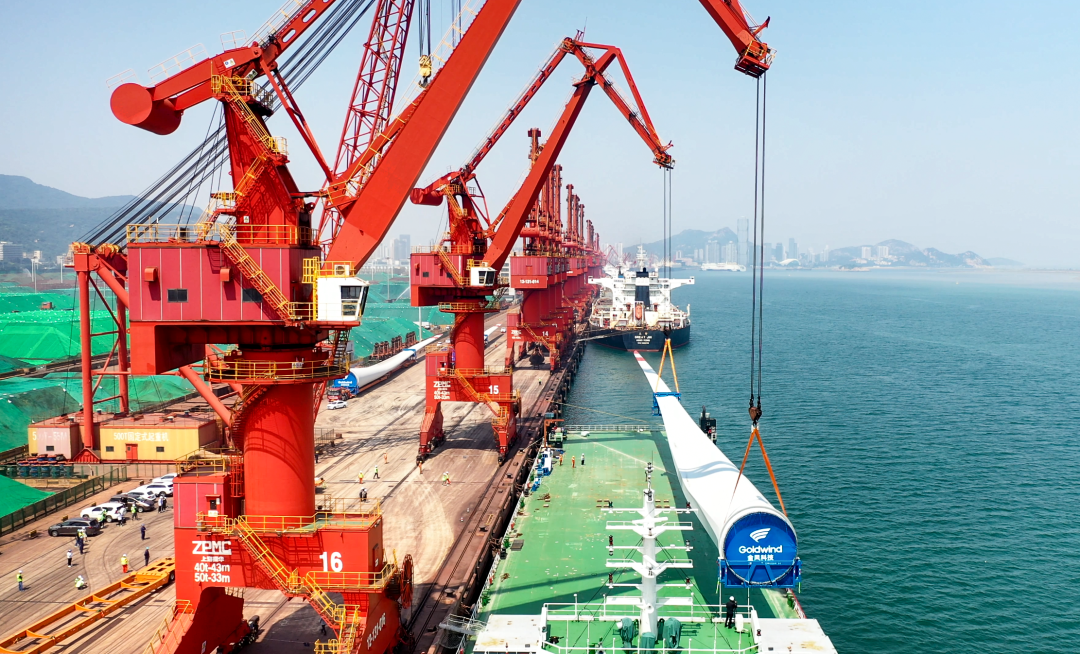
China tops NEV market with 20 millionth vehicle rolling off production line
China's 20 millionth new energy vehicle (NEV) rolled off the production line on Monday in Guangzhou, capital of Guangdong province.
With this record, the NEV sector has now entered a new stage of large-scale, globalized, high-quality development and is becoming an important part of China's modern industrial system. It took 15 years for China's NEV’s to reach the first 10 million, while the second 10 million took only a year and five months.
Industry experts say that the rapid development of China's NEV sector is due to constant breakthroughs in its core technology, steady improvements in industrial chains as well as accelerated construction of the battery charging infrastructure.
June 2023
China's foreign trade up 4.7% in Jan-May period
China's total imports and exports grew 4.7 percent year-on-year to 16.77 trillion yuan in the first five months, data from the General Administration of Customs showed.
Exports grew 8.1 percent to 9.62 trillion yuan in the first five months compared to the same period last year while imports rose 0.5 percent to 7.15 trillion yuan, the administration added.
In the first five months of this year, the Association of Southeast Asian Nations remained China's largest trading partner. The total imports and exports expanded 9.9 percent year-on-year to 2.59 trillion yuan, accounting for 15.4 percent of China's total foreign trade volume, the administration said.
Transit port to bolster regional growth
China's move to add Vladivostok in Russia as a cross-border transit port for domestic trade shipments from Jilin province will further bolster economic growth in its northeastern region.
Starting on June 1st, goods shipped from Jilin to domestic destinations can travel through the port in Vladivostok, a city in the Russian Far East.
This decision is in line with the national strategic plan to boost the old industrial base in Northeast China and simplify cross-border transportation of domestic goods via international ports.
Logs import from Australia resumed
According to relevant laws and regulations in China and international standards, China resumed import of Australian logs.
China customs started to clear Australian logs from 18th May 2023 which was suspended since 31st Oct 2020 as quarantine pests were detected several times from imported Australian logs.
Australia is one of the countries of origin for imported logs, amongst New Zealand, Russia and others.
Exit, entry policies optimized
China fully restored fast-lane entry and exit services at all ports starting on 15th of May 2023, facilitating the cross-border travel of Chinese citizens and foreign nationals. The National Immigration Administration issued a circular announcing the adjustments to immigration policies.
Chinese nationals will be allowed to use fast lanes for expedited border inspection on the following travel documents: Chinese ordinary passports, exit-entry permits for travel to and from Hong Kong, Macao and Taiwan, mainland travel permits for Hong Kong and Macao residents, five-year mainland travel permits for Taiwan residents, and multiple entry permits valid for one year, the administration said in a notice.
Foreigners can use the service with their passports and China-issued ID cards for foreign permanent residents, or with their electronic passports and residence permits with a validity period of more than six months.
China's export of automobiles continuously surges
From January to April this year, Chinese automobile enterprises exported 1.37 million vehicles, up 89.2 percent year-on-year, of which 348,000 were new energy vehicles, up 1.7 times year-on-year, according to China Association of Automobile Manufactures.
China's automobile export increased 58.1 percent to reach 1.07 million units in the first quarter of this year, surpassing last year's global leader, Japan, who exported 954,000 in Q1 this year.
The export routes spread throughout Europe, Southeast Asia, South America and the Middle East.
First shipment of corn from South Africa arrived in Guangzhou
A bulk carrier shipping 53,000MT of corn loaded ex South African port arrived at Machong of Guangzhou early May this year, the corn was imported by COFCO - the national grain trader.
Besides the traditional supplying countries, China recently has switched to import grain from South American and African nations, in order to stabilize and enrich its supply chains.
World Bank revises up China's growth to 5.6%
The World Bank has predicted China's economy will grow at 5.6 percent this year, up by 1.3 percentage points from its January forecast, but has revised down projections for most economies, as it sees global growth on a precarious footing amid high interest rates.
The World Bank, in its Global Economic Prospects report released on Tuesday, said that economic activity in China bounced back in early 2023, spurred by the earlier-than-expected economic reopening, which drives consumer spending, particularly on domestic services.
Flighted sponge moth complex highly risky period starts
FSMC, formerly known as AGM(Asia Gypsy Moth), high risk period started in North China(north of parallel 31˚15’N) on 1st of June and will end on 30th of September, inspection and certification services by authorized organization in most China ports are available on request.
Summer rules in Yangtze river issued
Recently, Jiangsu MSA released a circular aiming to strengthen supervision on vessels operations during the summer high temperature and flooding season in the Yangtze river.
All vessels intending to enter the river must remain in good operational condition and order. Experienced pilots are to be assigned for the river sections, vessels out of control for 2 times in the past year are denied entry. Tonnage of cargo carried onboard can not exceed 4 times of the horsepower of the main engine.
Minimum speed with head current should not be less than 4 knots and should not be less than 6 knots with pushing current when vessels steaming in the traffic lanes. Berthing, unberthing and passing through Yingongzhou, lower section of Hechangzhou and Simawan channels in night time for vessels with LOA over 150 meters and tankers with DWT over 5,000MT carrying liquid dangerous chemicals are prohibited.
When river water reaches its critical level, one additional tug shall be employed for berthing and unberthing operations.
When air temperatures rise to 35℃ or above, cargo operations of oil in bulk with close cup flash points below 28℃ and liquid chemicals in bulk must be suspended, cargo operation of dangerous liquid in bulk, cleaning of cargo tank, disposal of slop or sludge and supply of bunker must be suspended during thunder and lightning weather or wind scale 7 and upwards.
Crude oil storage capacity expanded in Dongjiakou
Construction of Zhenhua storage tanks in Dongjiakou was completed and come into operation on 2nd of June, 800,000 cubic meters were added into the total crude oil storage capacity of 8.26 million cubic meters in the port, with 8 new tanks of 100,000 cubic meters each.
Moreover, phase III of the commercial storage project under construction expects to complete this year, contributing another 1.8 million cubic meters storage capacity.
New berths at Dalian, Dandong and Tangshan accepted and open for commercial operation
In the end of May and the beginning of June, 18 new berths at Dalian, 2 new berths at Dandong and 2 new berths at Tangshan were inspected and granted by the local authorities, e.g. harbor office, customs, MSA and immigration for commercial operation. These newly operational berths will apparently ease the congestion state in these ports and significantly enhance the competitiveness of the ports.
The new berths include those for handling grain and mineral ore in bulk, Ro-Ro, container, crude and products oil, etc.
MSA implemented pre-arrival evaluation mechanism for vessels calling Dongjiakou
As of 1st of June, all vessels scheduling to call Dongjiakou will be evaluated by MSA prior to arrival and vessels will be categorized into 3 risk levels - low, medium and high risk.
High risk vessels might be rejected for entry while medium risk vessels are to be physically boarded and inspected in the anchorage, and needs to rectify the deficiency before being allowed to berth.
Documents for evaluation are to be provided through the agents via email to: psc_dongjiakou@sd.msa.gov.cn, the vessel, her agents and other related party bear joint and several liability for the authenticity of the document and will be punished by MSA for false declaration.
VLCC using LNG fuel docked in Rizhao
Newbuilding VLCC mt “Advantage Vital” made her maiden call to Rizhao recently, by burning LNG instead of fossil oil, the tanker reduced CO2 emission by 20% compared with those generated by traditional bunker. Clean energies are the trends for marine shipping industry to achieve carbon emission goal.
May 2023
NAT No Longer Required for Inbound Foreign Passengers
The Ministry of Foreign Affairs recently declared that in order to facilitate cross border travel, NAT(Nucleic Acid Testing) certificates issued within 48 hours before boarding a flight will not be required for foreign passengers travelling to China as of 29th of April 2023. Rapid Antigen Tests are to take its place instead.
Safety Check on Key Equipments by Crew prior to Port Entry in Qingdao
As of 24th of April 2023, to enhance the safety of vessels during port operations, all tankers and vessels over 200,000 MT DWT and vessels which had machinery failure previously while calling Qingdao, are obligated to have their key equipment(ME, AE, steering gear, anchor, etc.) thoroughly checked by the crew prior to port entry. The crew is to make sure that all machinery is in good operational condition and the results are to be reported to MSA(Maritime Safety Administration) in writing via email at djkvts@126.com.
Tianjin Receives Biggest Manganese Ore Vessel This Year
On 21st of April 2023, a Capesize bulker - MV Niseko Queen, arrived at Tianjin port with 205,000 MT of manganese ore onboard. Shipped from the West African country of Gabon, the total value of the cargo was around 36 million USD. This is the biggest manganese vessel the port handled this year.
First LNG Bunkering Operation at Anchorage Successfully Conducted in Shanghai
On 26th of April 2023, LNG supplying tanker “Hai Gang Wei Lai” arrived alongside container ship MV Zim Mount Everest at Lvhuashan anchorage near CJK and supplied 1,600 CBM of duty-free LNG clean bunker. Shanghai was the first port in China for LNG to be supplied to vessels, since its first LNG bunker supply in 2022.
“Hai Gang Wei Lai” belongs to Shenergy Group and has a tank capacity of 20,000 CBM, it is the biggest LNG supplying tanker in the world, and has replenished 38 vessels with LNG since March 2022.
In late March 2021, oil major Total and Shenery Group signed an agreement for the supply of 1.4 million tons of LNG per year supplied by Total. A new joint venture was also formed to expand the LNG market in China.
New Container Line Set up between North China and Europe
MV MSC Katie of container liner giant MSC, called Dalian early May, indicating the inauguration of the new container line between North China and European ports. Dalian is the only port in North China on the new line and there are a total of 11 vessels with a combined capacity of 14,000 TEU each to be deployed on the line. Opening of the line will benefit and boost foreign trade for the NE China regions.
Throughput Hits Record High in Jingtang Port
By 1st of May 2023, total cargo handled in Jingtang reached 100 million tons for the first 4 months of this year, 22 days earlier than last year. Main cargo consists of bulk ore and steel products, contributing significantly to the total throughput in the port. The annual throughput in Jingtang is expected to be 300 million tons this year.
Three-year Action Plan” on Ship Survey Industry Launched by MSA
Recently, a “Three-year Action Plan” on ship survey aiming to regulate and promote high-quality development for the ship survey industry(2023-2025) was launched by China MSA, the plan particularly emphasized consolidating laws and regulations and improving high-quality development systems of the ship survey industry, setting up a service quality monitoring system and promoting the professionalization of local ship survey agencies.
It's the first year of the "Three-Year Action Plan" this year, MSA will build up a mechanism to strengthen coordination and organization of the implementation of the "Three-Year Action Plan".
Transit Visas Required in the Ports of Yangtze Delta
For crew disembarking at Zhoushan, Nantong, Changzhou, Jiangyin, Changsha, Zhenjiang, Yangzhou and Taicang, transit visas are necessary documents as required by the immigration office before they are given the green light to be repatriated from China.
However, the crew of those leaving China within 24 hours upon disembarkation will be exempted from such visas.
Grain Imports Continue Growth in China
China continuously increased its imports for grain this year, 38.7 million tons of grain were imported in the first quarter, a year-on-year increase of 4.7%. Major traders are COFCO, SINOGRAIN, Cargill, Louis Dreyfus, Bunge among others.
Channels Survey Started in Shanghai
Shanghai maritime surveying and mapping centre carried out a new round of comprehensive waterway surveying since early February, the survey covered CJK north deep water channel, CJK south channel, Waigaoqiao channel, Yangshan deep water channel, Huangpu river channel as well as other key waters in Shanghai port.
Hydrographic data, nautical charts and ECDIS will be updated upon completion of the survey, so that shipping circles are provided with up-to-date information to ensure safe navigation for vessels.
Seaway Passenger Transport to Korea ex Lianyungang Expected to Resume
Along with the optimized epidemic control policies, relevant governmental departments(Immigration, Customs, MSA, etc.) and the ferry operator in Lianyungang are preparing to resume the passenger line between the port and Incheon, South Korea shortly.
The passenger ferry line was initially opened about 20 years ago between Lianyungang and Incheon, a joint venture was established by Lianyungang port group and a Korean ferry company, the ferry line provided an easy and fast means of transport for the people of the two nations and facilitated people to people exchange. The ferry services were suspended during the covid pandemic.
April 2023
More International Flights Resumed
Following the easing of Pandemic restrictions, Chinese airlines such as China Eastern, China Southern and Xiamen Airlines recently resumed and even increased a number of international flights between major airports in China and international destinations. These actions will greatly benefit crew changes, especially those of foreign nationals coming to China to join a vessel.
“Zero Tax” Policy on Coal Import Extended
To stabilize the supply of coal, the Tax and Tariff commission of the State Council announced in late March that from the 1st of April 2023 till the 31st of December 2023, imported coal will remain tax-free.
The import of coal from Australia was officially resumed as of February 2023, after nearly three years of suspension.
RMB Internationalization Steps Up
The Chinese currency RMB is speeding up in expanding its global usage, a trend that will help build a more resilient international monetary system, one that is less dependent on the US dollar and more conducive to trade growth.
China and Brazil - two major emerging economies and BRICS members - reportedly reached a deal to trade in their own currencies, ditching the US dollar as an intermediary.
RMB internationalization will likely accelerate, underlining that the recent developments indicate that an alternative monetary system outside the US dollar hegemony is being developed.
Landing Visa in Shanghai Suspended
Landing visas for inbound passengers arriving with international flights in Shanghai started on the 24th of March 2023, but was temporarily suspended recently. Agents involved are required to participate in a special training course. The resumption of the visa is still pending and further development to be informed once known.
Import of Livestock From New Zealand Kicks Off in Jinzhou
The first shipment of live cattle will arrive in Jinzhou, North China by the end of May this year. The shipment contains 3,800 heads of cattle, indicating the “0” breakthrough of livestock imports in the port and enlarging the business outreach of the port.
Underwater Hull Inspection and Cleaning with Robots
Thanks to the development of new AI technology, robots have been introduced and utilized in underwater hull inspections and cleaning for vessels. Compared to the traditional manual method by divers, robots are safer, more time-saving and cost-efficient, and more importantly, robots are able to do the job in muddy waters and in adverse sea conditions.
Oceanfavor Shanghai office has successfully arranged inspections and cleaning for several vessels this year.
Shield Tunneling Machine Shipped Abroad
Formerly an imported product, China began manufacturing shield tunneling machines with her own intellectual property rights in recent years. These have not only met domestic demands, but have also been exported to overseas clients. Today, China has become one of the top suppliers for shield tunneling machines in the world.
At the beginning of March 2023, Dalian Jenshine Logistics Co., Ltd. - a Logistics Division of Oceanfavor Group based in Dalian, successfully organized shipments for three sets of shield tunneling machines to Indian ports. In the last three years , Dalian Jenshine has forwarded over 30 sets to worldwide destinations.
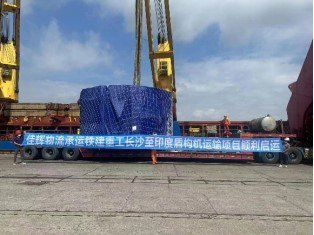
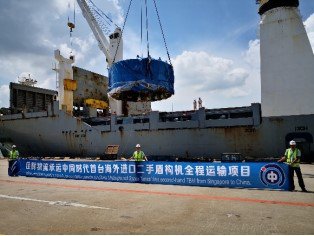
Distribution of Bunkering Anchorages at Zhoushan
There are a number of anchorages where vessels can lift bunkers at Zhoushan, here is a summary of the anchorages with individual restrictions and latest operational status:
- Xiazhimen anchorage - an OPL anchorage, available 24 hours a day weather permitting but shelterless and liable to be impacted by heavy weather
- Tiaozhoumen anchorage - an OPL anchorage, available for daylight only
- Xiushandong anchorage - an inner anchorage, now becoming operational 24 hours a day weather permitting but only 10 authorized bunker barges are allowed for night time operations
- Mazhi anchorage - an inner anchorage, operational 24 hours a day weather permitting
Commercial Operation of VLOC Berth on Trial in Lianyungang Port
With a designated berthing capacity of DWT 400 thousand metric tons and a maximum draft of 22.08m alongside, a VLOC berth is on trial to open for commercial operation recently at Lianyungang, at the end of March, M.V. CSB Brilliant carrying 310 thousand metric tons of iron ore became the first ship to berth alongside, it broke the record for the biggest bulk carriers Lianyungang has ever handled. The berth was the first one for accommodating VLOC in Jiangsu province.
Quarantine Measures Taken for Crew Disembarking at Yingkou
Crew intending to disembark at Yingkou, North China are subject to nucleic acid tests prior to disembarkation, according to the latest local quarantine rules. The vessel involved is to be disinfected thoroughly by an authorized shore service, in case any crew tests positive. Fortunately, no apparent disturbance to cargo work was observed.
Bulk Ore Import Continuously Grows in China
Iron ore imports reached its historical record high to 194 million metric tons for the first two months this year. Australia remains the biggest origin country, followed by Brazil.
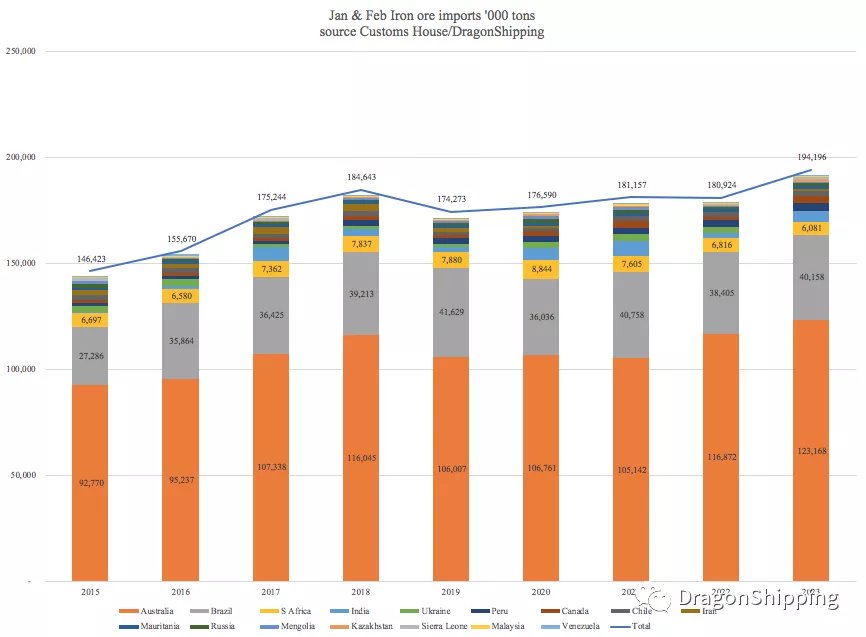
Coal imports also grew rapidly by 70.8% on a year-on-year basis, amounting to 60.7 billion metric tons for January and February, including 207 thousand metric tons from Australia. Indonesia, Russia and Mongolia are the next three biggest suppliers of coal imports.
March 2023
China to Resume Issuing All Types of Foreign Visas
China's visa offices abroad will resume issuing all types of visas to foreigners on Wednesday to facilitate cross-border travels.
Also, foreigners with valid visas which were issued before March 28, 2020 will be able to enter the country.
The Foreign Ministry's Department of Consular Affairs announced these decisions on Tuesday.
The country will also resume the issuance of all types of port visas to applicants with lawful reasons, and resume visa-free entries to Hainan province, among other regions, according to the department.
Foreign Crew Change Carried Out by OceanFavor at Qingdao and Jinzhou
All COVID-related restrictions have been scrapped since early January and foreign crew change has fully resumed in Chinese ports. Owner’s crewing agencies are seeing more positivity from authorities as prior application and approval policies are no longer required and government facilities have resumed for foreign crew change.
Currently, as per the latest quarantine policies, the only requirement is that crew have self administered an antigen test onboard 48 hours before arrival and declared to the customs via their agents.
First Capesize Bulker Successfully Lightening at Jinzhou
One Capesize bulk carrier lightened her part cargo of Australian iron ore at Jinzhou port of North China recently. This unprecedented event marks a significant milestone for the port to promote its capacity of throughput. Consequently, Jinzhou is now becoming a new point for vessels’ lightening operations.
CJK Vessel Traffic Management Strengthened
To ensure safe navigation for vessels, Shanghai MSA(Maritime Safety Administration) announced a notice aiming to strengthen the management of traffic in the Yangtze river estuary and its adjacent waters, with full effect as of the 1st of February 2023. Please click right here for the full article. All mariners are to exercise extreme caution when navigating the area to avoid marine accidents and close quarter situations.
Port State Control Campaign in China Ports
After a suspension lasting around 3 years due to the COVID pandemic, PSC onboard inspections in most China ports have been resumed as of the beginning of this year. Data shows the number of physical inspections at Chinese ports has increased substantially in recent days. The number of ships detained by China PSC in January was 14, increasing significantly to 79 in February. In the port of Yantai, as many as 6 ships were detained out of 10 inspections.
In some ports like Ningbo, PSCO has begun inspecting the officer crew's operational competency.
If detention code 30 is issued to a high ranking crew, he must be signed off and the vessel can only depart once a substitute crew member is on board.
High risk ships are as always, drawing more attention from PSCOs. Owners, Operators and Masters are highly recommended to pay acute attention to detail when preparing for inspections. Self checks and immediate rectifications can go a long way in preventing serious inspection deficiencies and detentions.
Dense Sea Fog in North China
During the winter to spring transitional period, specifically between November and April, dense fog in North China(North of Yangtze River) becomes quite common and one of the major threats to maritime safety. Ports can be closed to traffic while cargo operations in port are suspended when dense fog prevailed causing very poor visibility and high moisture.
Dandong, the port most impacted by fog in NE China, suffers an average of 51 foggy days in a year. Delays on vessel operations during this season should be taken into consideration by Owners and Operators passing through this area.
Chinese Shipyard Delivers Very Large Crude Carrier
New Splendor, a very large crude carrier (VLCC) with a loading capacity of 300,000 tonnes, was delivered to its customer in the coastal city of Dalian in Northeast China's Liaoning province on the 4th of January 2023.
The manufacturer, the Dalian Shipbuilding Industry Co Ltd said this ship features leading energy-saving technology in terms of the shipbuilding industry -- which enhances the international competitiveness of China's shipbuilding and shipping industry.
The ship's design meets the requirements of the latest emission standards of nitrogen oxides and
sulphur oxides, and also the hazardous substances list in the EU regulation on ship recycling.
Asian Gypsy Moth(AGM) Renamed
Information from a joint announcement by the US, Canada, Argentina and Chile shows AGM will be officially renamed as Flighted Spongy Moth Complex (FSMC) as of the 1st of March 2023, title of the newly issued certificate is to be updated consequently.
CCIC(China Certification and Inspection Corporation) is the solely authorized organization to perform FSMC inspection and certification.
From the 1st of June through to the 30th of September is the high risk period in North China(North of parallel 31°15’N). Vessels are subject to such inspections before departing the last Chinese port.
ART to Replace NAT for Certain Inbound Passengers
According to Civil Aviation Administration of China, as of the 1st of March 2023, inbound passengers from 17 countries can replace NAT(nucleic acid test) with ART(antigen rapid test) conducted within 48 hours before boarding the plane. These countries include Thailand, Indonesia, Cambodia, the Philippines, Malaysia, Singapore, Laos, UAE, Kenya, Russia, New Zealand, Maldive, Sri Lanka, South Africa, Egypt, Switzerland and Hungary.
Previously, all arriving passengers are required to have a valid NAT reports issued 48 hours prior to boarding. In the meantime, Arrival Visa and Letter of Invitation with barcode issued by the government was resumed and shall be required upon entry.
Fuzhou Jiangyin Port Qualified for Cereal Imports
We have learnt from the Customs General Administration that Jiangyin port in East China Fuzhou was recently authorized for cereal imports, including wheat, soy bean, corn, canola, barley, sorghum and other HSS. This greatly enhances the grain imports of Fujian province, in addition to the traditional ports in the province, such as Xiamen, Kemen and Zhangzhou.
February 2023
New Marine Bunker Supplier Opens for Commercial Operation
“Shanghai Fuyuan Supply Co. Ltd” - a newly established marine bunker supplier and a wholly-owned subsidiary of PetroChina, came into operation on the 17th of January 2023 in Shanghai. It brings with it one more option for the marine shipping industry in securing tax-free fuel in China.
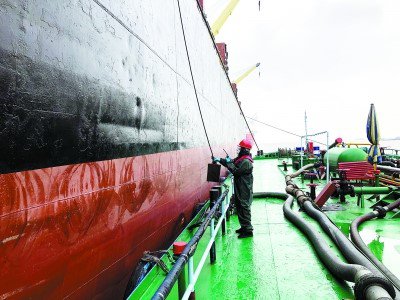
Numerous China Ports Ranked World’s Largest Ports in 2022
Ningbo-Zhoushan remained the world’s biggest port for the 14th consecutive year in terms of total annual throughput, while Shanghai made herself the biggest port in handling containers for the 13th time as of last year. Trailing closely behind, Shenzhen and Qingdao came in at 4th and 5th place respectively.
Surprisingly, port of Tangshan in North China Hebei province overtook Shanghai and took the 2nd place in terms of throughput, the growth of the port benefited from the large amount of bulk cargo it handled, including ores and liquid chemicals.

Dandong Deeper - Opening Plan Approved
The most northern Chinese port of Dandong will be opened further to foreign commercial operations starting in early 2023. As approved by the State Council, all 18 berths totaling a length of 6,300 meters will be utilized. This decision would not only benefit the neighbouring cities, but also the entire NE regions of China.
China has Started the Importing of Corn from South America
The first shipment of bulk corn loaded from a Brazilian port just arrived in Guangdong on the 7th of January 2023, marking the very beginning of China’s import of corn from South America. The 68,000 tons of cargo were imported by national grain giant COFCO(China Oil & Foodstuffs Corporation) and are to become a supplemental sources for China’s cereal reserve. As the biggest grain trader in China, COFCO traded 180 million tons of cereal in the year of 2022.
Australian Coal Import Resumed
Two ships carrying Australian coal arrived in China ports early February. These were the signs of a resumption of Australian coal export to China since the suspension about 2 years ago. The coal was rumored to have been discharged at Zhanjiang and Changshu respectively, with Baowu Steel Group believed to be one of the potential buyers of said coal.
Logs Handled in Penglai Increase
Port of Penglai handled over 1 million CBM of logs in 2022. As one of the top 10 China ports importing wood product, Penglai was the first authorized port for wood imports in the region of Yantai and Weihai. In recent years, Penglai has also started to import wood chips.
Cereal Imports by China in 2022
According to Customs data released recently, China imported 147.5 million tons of cereal(including soybean, corn, sorghum, wheat, rice and barley etc.) last year, which is 18 million tons or 11% less than the year before that. The total cereal imported of 2022 was made up of 93 million tons of soybean, 20.6 million tons of corn, 10 million tons of sorghum, 11.8 million tonsof wheat, 6 million tons of rice and 5.8 million tons of barley. Brazil remained the biggest origin for soybeans followed by USA. Most of the corn came from USA, while Australia was the biggest exporter of wheat to China.
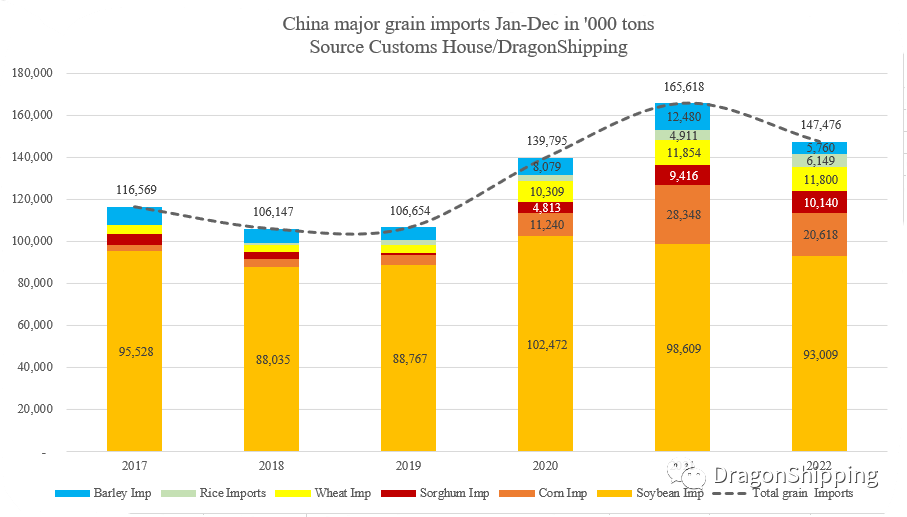
China Leads Globally in Ship Orders & Output
China remained the world's leading shipbuilder in 2022, grabbing the largest market share and making breakthroughs in high-end ship models.
The country topped the globe in three major indicators — contributing 47.3% of global output, receiving 55.2% of new orders and obtaining 49% of holding orders, data from the Ministry of Industry and Information Technology showed.
Chinese companies received 55 LNG carrier orders in 2022, accounting for over 30% of the world's total, a record high for the country.
